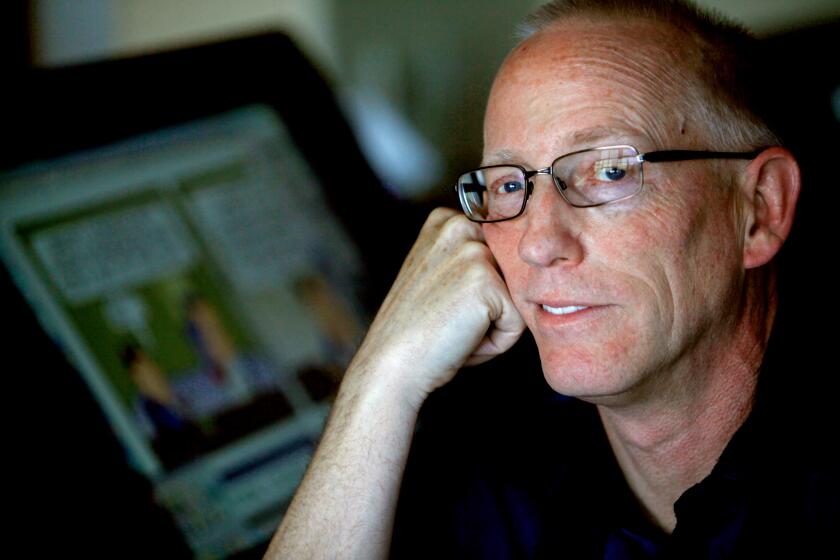After Janet Jackson’s Prank, the Truly Indecent Behavior
- Share via
Having deleted the Super Bowl from my TiVo box immediately after the winning field goal and thus before I learned that there had been something worth watching at halftime, I was among the millions of Americans who got a warts-and-all look at Janet Jackson only because the 24-hour news channels reran the incident 47 times an hour for the next two weeks straight.
I have, however, been a real-time witness to the even more shocking display of public indecency that has ensued: the outbreak of rank hypocrisy among politicians, regulators and media executives falling all over one another to declare themselves profoundly dismayed by the junk they’ve been routinely allowing over the air.
The high water mark of this ritual so far has been the decision by Clear Channel Communications Inc., a radio behemoth whose cancer-like expansion has been nourished by the complaisance of the Federal Communications Commission, to pull Howard Stern off the air in six cities. The network’s rationale was that a recent Stern segment that included references to a crude epithet for blacks, anal sex and the size of various peoples’ genital organs “blew right through” a “line in the sand” the network had drawn against indecency.
One might conclude from this that Clear Channel had a right to be shocked. However, as a frequent listener to the Stern show, I can state without fear of contradiction that there has probably not been a single day in the last 10 years in which all three of those references haven’t been an integral part of the program. In other words, if Clear Channel truly drew a line in the sand, it carefully drew it at a point it knew Howard Stern had long since crossed.
Furthermore, given that Clear Channel owns about 1,200 stations across the country and the Stern show airs chiefly on Viacom Inc.’s competing Infinity Broadcasting System, cutting him loose is scarcely an enormous sacrifice. Considering the slickness with which Clear Channel managed to point a public finger of blame at its rival, Viacom, it probably considers any financial loss from the Stern suspension to be money well spent.
Clear Channel last week also fired, on indecency grounds, a Florida DJ known as “Bubba the Love Sponge.” Lest anyone mistake this action as the result of genuine soul-searching, keep in mind that a month earlier, the FCC had fined the company $775,000 -- the largest such fine in FCC history -- in connection with a string of obscene and tasteless skits aired during Bubba’s morning show in Miami.
That fine and the coincident negative publicity, not to mention the nation’s bluenosed environment just now, no doubt had something to do with Clear Channel’s sudden recognition that firing the DJ was, in the words of radio division CEO John Hogan, “the right thing to do.”
What Hogan didn’t mention was that Clear Channel had fought the FCC tooth and nail for a couple of years to keep Bubba’s show on the air, at one point arguing that although the program may have happened to include “references and phrases of a sexual nature,” that in itself wasn’t enough to “make the broadcasts indecent.”
Still, Clear Channel’s two-step is nothing compared with the fake piety exhibited by the man who probably bears the most responsibility for setting broadcast tastelessness loose on the public: FCC Chairman Michael K. Powell. A commissioner since 1997 and chairman since 2001, Powell was fast off the mark after the Super Bowl, complaining the very next day about the outrage perpetrated upon him when, “like millions of Americans, my family and I gathered around the television for a celebration.”
Leaving aside the question of what Powell thought he was celebrating by viewing the single most overhyped and commercialized event in American entertainment -- The U.S. snack food industry? The principle of monopoly control of sports leagues? The decline of pop music? -- the trends that have launched a thousand fulminating press releases are largely the result of his own agency’s servile regulation of the ever more concentrated broadcasting industry.
Powell has been the most strident voice on the FCC for allowing big media companies to get bigger. His agency staff has come up with one fatuous argument after another for why media consolidation benefits, rather than threatens, the public interest.
They point out that, where TV viewers once had only three networks to choose from, there are now scores of cable channels on the scheduling grid; what they don’t say is that almost all the most powerful cable channels are owned by the same handful of broadcasting conglomerates.
Powell himself pressed to increase the maximum allowable population that could be reached by a single company’s television stations to 45% from 35%; Congress last year ratcheted him back to 39% (a level that still, conveniently, saved Viacom and News Corp.’s Fox Television from having to divest some TV stations they had each acquired).
Powell consistently signaled that almost any merger or expansion the broadcast groups proposed for their own enrichment was all right with his FCC. In a Wall Street Journal column last fall, he even signaled that he would go easy on content issues, arguing that free television desperately needed less regulation and broadcast companies needed more consolidation so they could “attract and maintain quality programming” to compete with the “greater creative freedom” of pay TV networks such as HBO. “A more hostile regulatory environment” for broadcasting, he wrote, “would prove disastrous.”
The notion that free TV needs the FCC’s help fending off competition from pay TV is ludicrous on its face. It amounts to the argument that the WB network (owned by Time Warner Inc. and Los Angeles Times parent Tribune Co.) needs protection from the superior latitude granted HBO (also owned by Time Warner); that ABC (owned by Walt Disney Co.) needs protection from ESPN (owned by Disney); and that CBS (owned by Viacom) needs protection from MTV (owned by Viacom).
The concentration of ownership in fewer hands is what allows the trends Powell now deplores, such as vulgarity and crassness, to spread unchecked through the airwaves, like a virus raging through a population without antibodies. If MTV and CBS were owned by separate companies rather than jointly, would the former have been able to produce the Super Bowl halftime show to air on the latter’s network without first having even a token discussion of standards and taste?
Now that CBS and MTV have shown what magic their corporate union can work in creating quality programming, one wonders whether Powell has changed his mind about the wisdom of his e pluribus unum vision of broadcasting’s future. Doubtful. By keeping the focus on taste and style, he is trying to deflect discussion of the industry’s troubling economic trends.
Will Congress go along with the charade? Even increasing the fines for indecency tenfold, as some lawmakers have proposed, won’t have one-hundredth of the impact on broadcasters as rejecting the next merger proposal or revoking a few licenses.
To judge from the grilling of television executives by posturing legislators over the last few weeks, the Super Bowl incident has plainly allowed a lot of generalized unease about broadcast standards to coalesce into one easy-to-grasp theme for subcommittee hearings.
But much of the furor is missing the point. It’s one thing to complain about the Janet Jackson thing, which truly took viewers unawares and was out of place even amid the taste-free zone that was the Super Bowl telecast. But it’s quite another to complain about programs whose nature is not only telegraphed well in advance but carefully tailored to the known audience, like the Howard Stern show.
The real issue is how to restore the notion that a broadcast license represents a public trust, not a corporate entitlement. The FCC has bought the media companies’ argument that its role is to help them pursue profits. It will take a lot more than a few wrist slaps over some dirty words and dirty deeds to convince the broadcasters, and their audiences, that it’s changing its ways.
*
Golden State appears every Monday and Thursday. You can reach Michael Hiltzik at golden.state@latimes.com and read his previous columns at latimes.com/hiltzik.
More to Read
The biggest entertainment stories
Get our big stories about Hollywood, film, television, music, arts, culture and more right in your inbox as soon as they publish.
You may occasionally receive promotional content from the Los Angeles Times.











